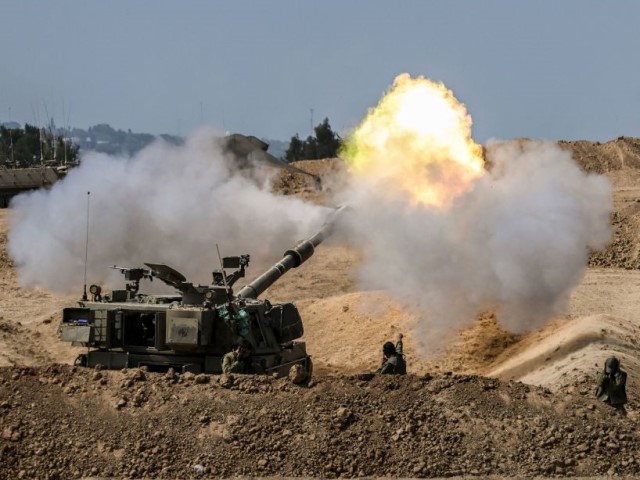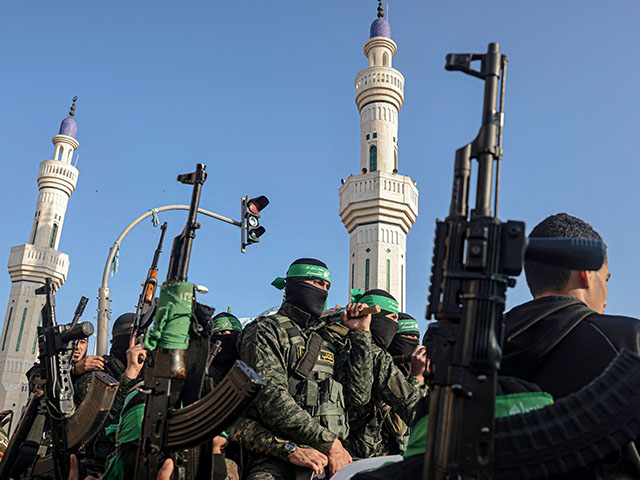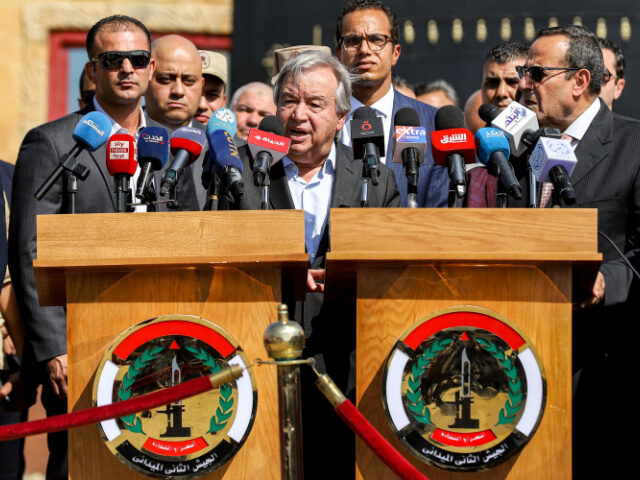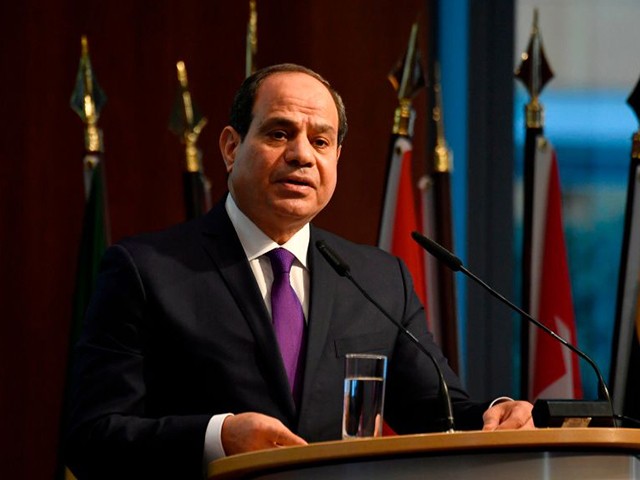United Nations Secretary-General Antonio Guterres visited the closed-down Rafah crossing between Egypt and Gaza on Friday, demanding Egypt allow trucks full of humanitarian aid into the Hamas-controlled territory but failing to urge Cairo to accept Palestinian refugees.
The government of Israel is engaging in targeted operations in Gaza to eradicate Hamas, a genocidal Islamist terrorist organization, from its stronghold in Gaza in response to a massive terrorist operation that killed 1,200 civilians and injured thousands in Israel on October 7.

Graphic content / Israeli artillery unit fire towards the Gaza Strip in southern Israel on October 13, 2023, as battles between Israel and the Palestinian Hamas movement continue (ARIS MESSINIS/AFP via Getty Images).
The terrorist attack, branded as the “al-Aqsa flood” by Hamas terrorists, consisted of door-to-door mass killings of entire families; the torture, abduction, and killing of civilians at a music festival; and the massacre of children at random. Israeli authorities reported finding the burned and decapitated bodies of dozens of babies in the aftermath of the attack.

Antonio Macías’ mother cries over her son’s body, covered with the Israeli flag, at Pardes Haim cemetery in Kfar Saba, Israel, Sunday, Oct. 15, 2023. Macias was killed when Hamas unleashed its attack on thousands of Jews attending a music festival in southern Israel earlier this month (AP Photo/Francisco Seco).
In preparation to respond to Hamas, the Israeli government has urged Palestinian civilians to leave north Gaza and Gaza City, where Hamas is believed to keep much of its weapons arsenal and logistics bases. Hamas has responded to Israel’s attempts to protect civilians by erecting roadblocks in Gaza and killing Palestinian civilians to prevent them from leaving. Egypt, the only other country bordering Gaza, has repeatedly insisted it would not accept any Palestinian refugees.

Members of the Ezzedine al-Qassam Brigades, the armed wing of the Palestinian Hamas movement (SAID KHATIB/AFP via Getty Images)
Guterres did not address allowing Palestinian refugees to leave Gaza while visiting the Rafah crossing, the only exit for Gazans seeking to flee. Instead, he urged the governments of Israel, Egypt, and the Hamas terrorist organization to let trucks full of humanitarian aid through Rafah.
“Behind these walls, we have two million people that is [sic] suffering enormously – that has no water, no food, no medicine, no fuel, that is under fire, that needs everything to survive,” Guterres said, according to a transcript the United Nations published. “On this side, we have seen so many trucks loaded with water, with fuel, with medicines, with food. Exactly the same things that are needed on this side of the wall. So these trucks are not just trucks. They are a lifeline.”
“What we need is to make them move, to make them move to the other side of this wall, to make them move as quickly as possible and as many as possible,” Guterres insisted.
“We are not in a no-man’s land. We are in the land of a sovereign country – Egypt,” he continued. “And it is essential to recognize the role of the Egyptian institutions and namely of the Egyptian Red Crescent.”
Guterres bizarrely concluded his remarks thanking the Egyptian government, which is responsible for keeping the border closed.
“I want to end by expressing my deep gratitude to the people and the Government of Egypt. Egypt is today the fundamental pillar that allows hope to exist on that side of the border,” the U.N. chief asserted. “Hope that these trucks will move to support them.”
Egyptian authorities reportedly agreed to open the Rafah border crossing on Wednesday, though no trucks appeared to be passing at the time of Guterres’s visit on Friday. Cairo had repeatedly claimed prior to nominally agreeing to open the border that the border was open already, although the government was allowing no transit in or out of Gaza.
Notably missing from the U.N. transcript of Guterres’s speech was any call for Egypt to allow Palestinian migrants out of Gaza in anticipation of a struggle between the Israeli government and Hamas. Guterres, formerly the U.N. High Commissioner for Refugees, is a vocal supporter of open-border policies and has for years demanded Western countries limit restrictions on who crosses their borders.
“Authorities that erect major obstacles to migration – or place severe restrictions on migrants’ work opportunities – inflict needless economic self-harm, as they impose barriers to having their labour needs met in an orderly, legal fashion,” Guterres lectured in an article published by the Guardian in 2018.
“Migrants make huge contributions to both their host countries and countries of origin. They take jobs that local workforces cannot fill, boosting economic activity. Many are innovators and entrepreneurs. Nearly half of all migrants are women, looking for better lives and work opportunities,” he asserted.
In remarks in 2019, Guterres demanded that Europe open all its borders to a surge of migrants from Africa and the Middle East, as “assimilating several culture[s] and legacies was the starting point of European culture.”
“Refugees represent the very best of the human spirit. They need and deserve support and solidarity — not closed borders and pushbacks,” Guterres said in remarks to mark World Refugee Day in June.
Egypt’s strongman leader Abdel Fattah al-Sisi has enthusiastically rejected the idea of allowing Palestinians to enter Egypt to avoid being used by Hamas as human shields. Last week, Sisi boasted that Egypt had “nine million guests … from many countries who came to Egypt for security and safety,” but Palestinians were “different” and not welcome because “the [Palestinian] cause is the top cause of all Arabs and it is important that [Palestinian] people remain steadfast and present on their lands.”
On Wednesday, Sisi suggested sticking Palestinian refugees in Egypt’s Negev Desert rather than granting them sanctuary in his country.
“What is happening now in Gaza is an attempt to force civilian residents to take refugee and migrate to Egypt, which should not be accepted,” Sisi insisted.
Sisi said accepting Palestinian refugees would mean “dragging Egypt into a war against Israel,” which he rejected.
“Egypt rejects any attempt to resolve the Palestinian issue by military means or through the forced displacement of Palestinians from their land, which would come at the expense of the countries of the region,” he declared. “If there is an idea to displace Palestinians from Gaza, why not transfer them to the Negev until the armed groups in Gaza, such as Hamas and PIJ, are eliminated?”
Editor’s Note: This story was updated to reflect a revised number on the death toll from the October 7 Hamas attack in Israel. The Israeli government estimate of 1,400 was revised to around 1,200, according to Reuters.


COMMENTS
Please let us know if you're having issues with commenting.